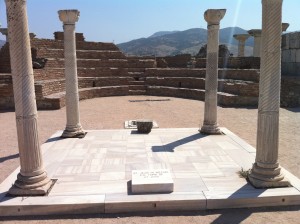
“I have offended God and mankind because my work did not reach the quality it should have.” These are purportedly Leonardo DaVinci’s last words. Five hundred years of art critics would disagree with DaVinci’s assessment of his work, but that is not the point here.
What is intriguing is DaVinci, perhaps the greatest painter who ever lived, had such a high standard of excellence, he believed what he produced was offensive to God. It would be easy to write-off DaVinci’s statement as false humility, but I think there is more here.
DaVinci would not have thought his effort offensive to God unless he believed God saw work as something sacred that demanded excellence. On this point he was right. The first two chapters of Genesis record God working (“…and by the seventh day God completed His work…”) and then commenting on the quality of His work (“…God saw all that He had made and behold it was very good.”). (Gen. 2:2).
When religious leaders criticized Jesus for working on the Sabbath Jesus said, “My Father is working until now, and I Myself am working.” (John 5:17). That must mean God was working from the time of creation until the time of Jesus, and I suspect He has continued to work since then. If God has been working continuously there must be something right about it.
And then there are numerous admonitions in the Bible about hard work and excellence like, “Whatever your hand finds to do, do it with all your might” (Eccl. 9:10), “Whatever you do, do your work with all your heart, as for the Lord and not for men…” (Col. 3:23) and “Do you see a man skilled in his work, he will stand before kings” (Prov. 22:29). Even after the kingdom of God has transformed the earth, people will be working, building houses and planting vineyards. (Isaiah 65:21). God has a very high view of labor.
It’s man who has denigrated and despised labor. We live for the weekends and look forward to the holidays. We can’t wait until five o’clock so we can leave the office. We work and save and work and save so we can retire as soon as possible. We act as if work is a necessary evil and that the higher calling is rest and relaxation. We have it backwards. In this respect we are the ones who are crazy. Rest is essential and holidays like Labor Day are nice, i.e. “beer is good.” Even God rested after He had worked. (Gen. 2:2). But rest is not the highest calling.
So, have a great Labor Day–if I haven’t ruined it for you–but look forward to getting back to work on Tuesday where you can please God with your hard work and excellence. GS




